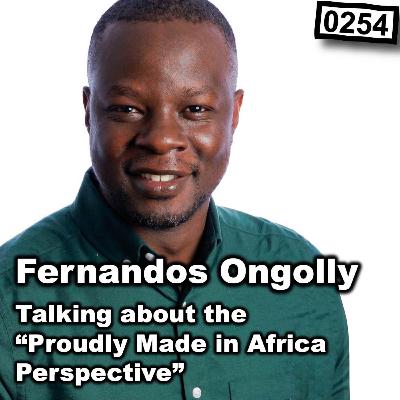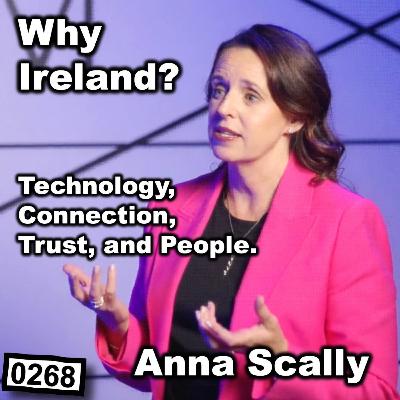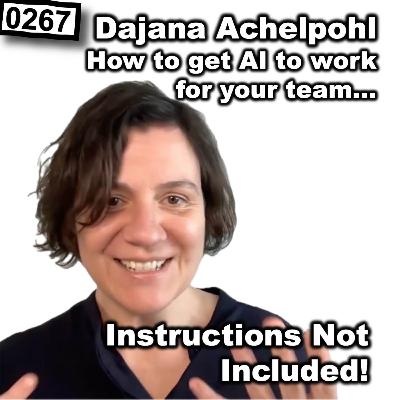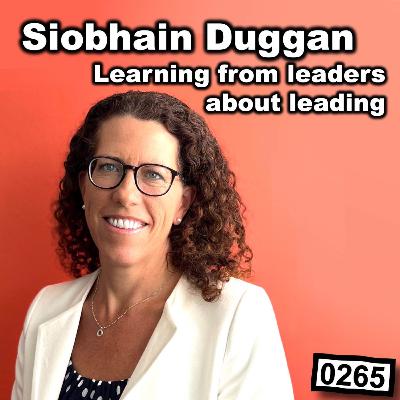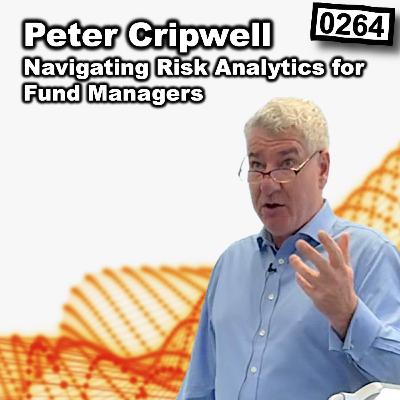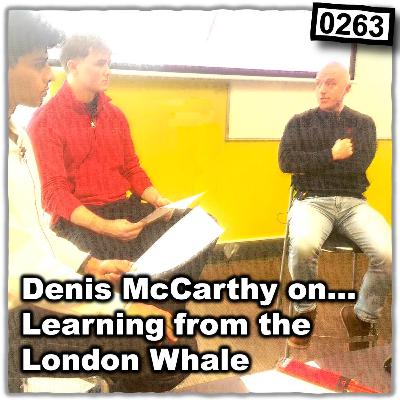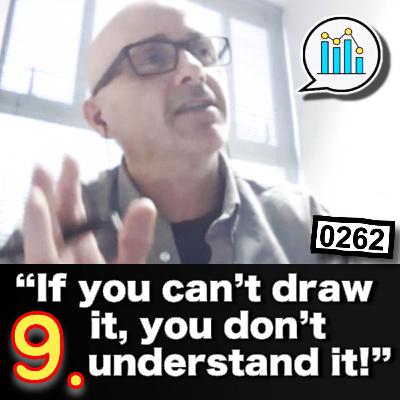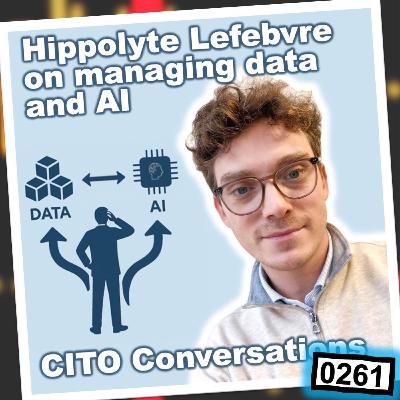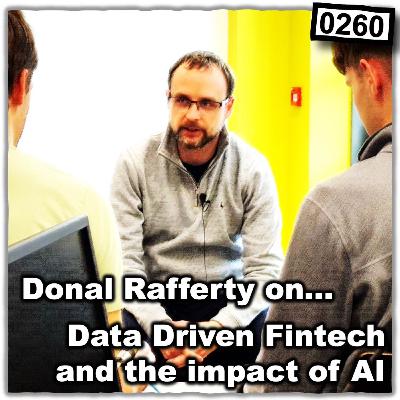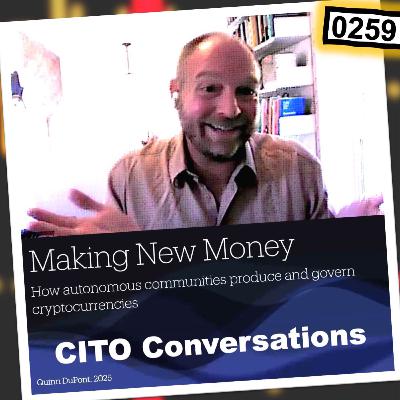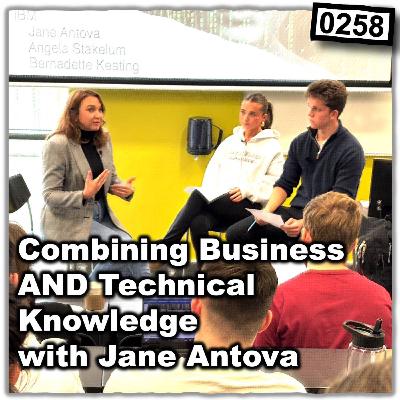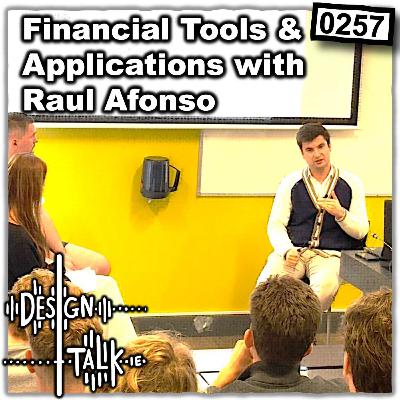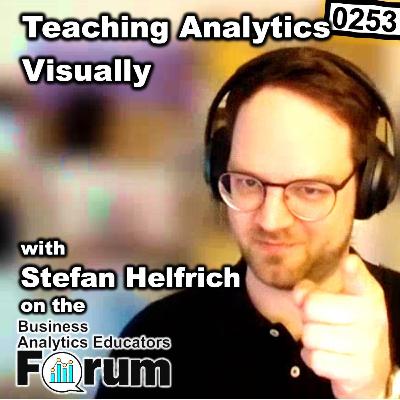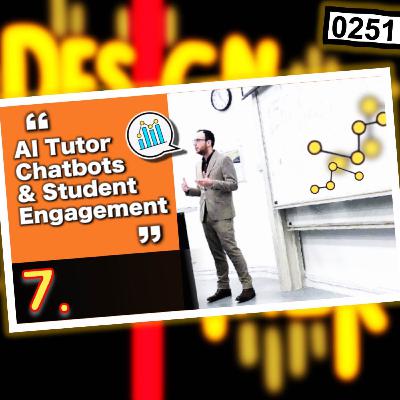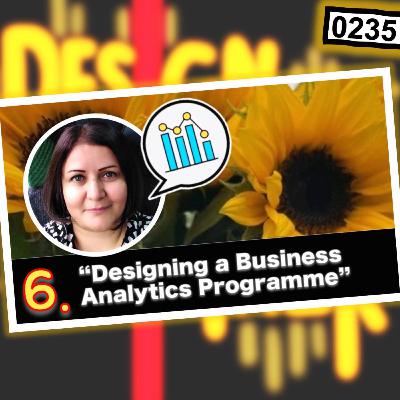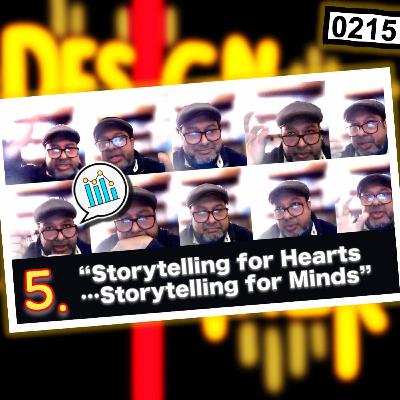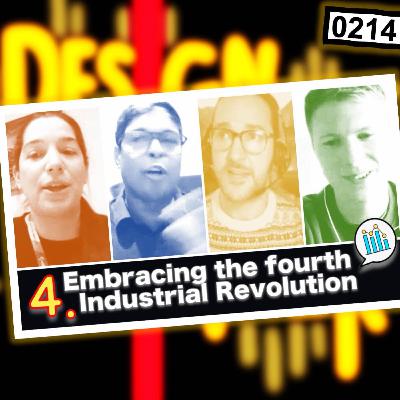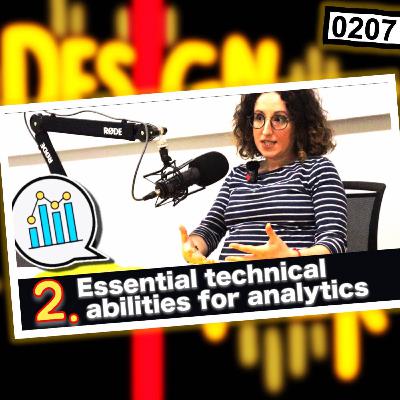Discover Design Talk (dot IE)
Design Talk (dot IE)

Design Talk (dot IE)
Author: Allen Higgins
Subscribed: 9Played: 157Subscribe
Share
© Allen Higgins
Description
Design Talk. A podcast for learning about the business of technology design and management. Listen to stories, panels, interviews and discussions about technology and design in-the-wild: the good, the beautiful, and the useful. Whether you've got one big idea, you think of yourself as an organisation designer, product designer, creator, or entrepreneur. Each episode offers a take on how people design, strategise, organise, and develop technology. We want to dig into the essence of design, discover the backstory to technologies, and unpack the design attitude. We started this podcast for you, because you are interested in tinkering, in making, and how ideas become 'things', and because we are all, in some way, involved in designing.
Hosted on Acast. See acast.com/privacy for more information.
190 Episodes
Reverse
Today we’re talking with Fernandos Ongolly, to learn about home-grown innovations and digital startups from The Continent – in this case, Africa. Our hosts are Selma Anya, Safa A. A. Emam, and Diana Achiro, students on the MSc Digital Innovation programme.Fernandos has a PhD from UCD. He is the current “Proudly Made in Africa” Fellow in Business and Development at UCD College of Business, and the founder of – Non-EU Academics and Researchers Community in Ireland.Our audience is the class of 2025 studying the Outsourcing and Offshoring module taught by Allen Higgins.First, Fernandos, would you like to say a few words about your current role and a little about your journey?· African nations might not be the first place that investors and business associate with “technology ambition”, can you set the context? [notes: technical infrastructure, physical infrastructure, population demographics, connectedness etc.]· Talk about some success stories from Africa and the sectors they occur in? [notes: in FinTech, Education, AgriTech and eCommerce]· What are the opportunities for outsourcing to Africa? [notes: BPO, content moderation and specialized services, much of today’s AI is/was trained by centers in Africa]· For the startup environment, like Silicon Valley, where are the incubators, clusters, and centers of excellence? [notes: the three big regions East, West and South – Kenya; Nigeria; South Africa]· Can you talk about the role culture plays. No doubt there are challenges but opportunities too? [notes: strong social ties, high-trust cultures, entrepreneurial attitude is prevalent – trading is a way of life]· Questions from the hosts· Questions from the audience.Further reading and notesFernandos Ongolly on LinkedIn - https://www.linkedin.com/in/fernandos-ongolly-phd-89927b32/Proudly Made in Africa is a Trade Justice and Global Citizenship Education organization. For more see - https://www.proudlymadeinafrica.orgAlso, the PMIA Podcast on YouTube - https://www.youtube.com/@proudlymadeinafricaAcknowledgementsMusic Title: Faceplant with UK GarageArtist: Allen HigginsSource: a-Wed23Oct2024License: CC BY-NC-SA 4.0. Includes samples from Ableton Live by Ableton AG and by KORG Inc.Cover Art Title: Guest and classArtist: Allen HigginsSource: Pepperdine_Fernandos.pptxLicense: CC BY-NC-SA 4.0Podcast LicenseDesign Talk (dot IE) CC BY-NC-SA 4.0 The license can be viewed at https://creativecommons.org/licenses/by-nc-sa/4.0By taking part, you give permission for your voice to be recorded, for the recording to be edited, and for it to be posted and published as a podcast. Hosted on Acast. See acast.com/privacy for more information.
Our guest for this session is Anna Scally - Partner and Head of Technology Media & Telecoms, KPMG in Ireland and EMA KPMG in Ireland. This is the third of 3 seminars organised by John Mooney as part of the Pepperdine Graziadio Business School MBA programme in collaboration with UCD’s MSc Digital Innovation programme.Anna gave a masterclass intro to corporate taxation in Ireland and its relationship with global trade (focus on technology companies). Yes, we need to talk about Trade, Tariffs, and Taxes, but the answers revolve around Technology, Connection, Trust, and People.Notes:Anna’s profile pages on KPMG.com (link) and LinkedIn (link)For more about the KPMG Global Tech Innovation competition 2025 (link)Washington National Tax (WNT); the KPMG think tank and technical core of KPMG’s U.S. tax practice. (link)Anna sits on the Advisory Board of Scale Ireland - https://www.scaleireland.com - Scale Ireland is Ireland’s leading independent not-for-profit, representative organisation for Irish tech start-up and scaling companies.IDA Ireland (the Ireland Development Authority) - http://idaireland.com - (Irish: An Ghníomhaireacht Forbartha Tionscail) is the agency responsible for the attraction and retention of inward foreign direct investment (FDI) into Ireland.Enterprise Ireland - https://www.enterprise-ireland.com/en/ - EI invests in and supports the development of Irish-owned companies “on their journey to achieving greater scale and to become global leaders in their field.” Revenue - Irish Tax and Customs – https://www.revenue.ie/ - The Tax Relief Scheme for Capital Expenditure on Intangible Assets (S. 291A) – (link)WTO landing page for learning about Tariffs –(link) AcknowledgementsMusic Title: First TakeArtist: Debajyoti Biswas and Michael O'NeillSource: mis.aup3License: CC BY-NC-SA 4.0Cover Art Title:(Screenshot from KPMG Platform – Global Tech Innovation 2024 launch event.)Artist: Allen HigginsSource: Pepperdine_AnnaScally.pptxLicense: CC BY-NC-SA 4.0Podcast LicenseDesign Talk (dot IE) CC BY-NC-SA 4.0 The license can be viewed at https://creativecommons.org/licenses/by-nc-sa/4.0By taking part, you give permission for your voice to be recorded, for the recording to be edited, and for it to be posted and published as a podcast. Hosted on Acast. See acast.com/privacy for more information.
Our guest for this session is Dajana Achelpohl. Dajana heads up AI Change Maker and is an alum of Google & PayPal. The second of 3 seminars organised by John Mooney as part of the Pepperdine Graziadio Business School MBA programme in collaboration with UCD’s MSc Digital Innovation programme.Notes:AI Change Maker - https://www.aichangemaker.comDajana on LinkedIn - https://www.linkedin.com/in/dajana-achelpohl/On other media:Dajana Achelpohl’s talk with Audrey Chia “A Framework for AI-Ready Teams” (YouTube link)From AI Ireland: ‘Demystifying AI: Practical Applications and Business Integration’ with Google’s Dajana Achelpohl (link)AcknowledgementsMusic Title: First TakeArtist: Debajyoti Biswas and Michael O'NeillSource: mis.aup3License: CC BY-NC-SA 4.0Cover Art Title: Instructions Not Included! (screenshot from Dajana’s talk with Audrey Chia on YouTube)Artist: Allen HigginsSource: Pepperdine_Dajana.pptxLicense: CC BY-NC-SA 4.0 Podcast LicenseDesign Talk (dot IE) CC BY-NC-SA 4.0 The license can be viewed at https://creativecommons.org/licenses/by-nc-sa/4.0By taking part, you give permission for your voice to be recorded, for the recording to be edited, and for it to be posted and published as a podcast. Hosted on Acast. See acast.com/privacy for more information.
Our guest for this session is Tom Rourke. Tom works in Kyndryl as Vice President for Design, Insights and Innovation. The first of 3 seminars organised by John Mooney as part of the Pepperdine Graziadio Business School MBA programme in collaboration with UCD’s MSc Digital Innovation programme.Notes:Tom Rourke – LinkedIn profile: https://www.linkedin.com/in/tom-rourke-1a8b70/Tom gave a shoutout to Kevin Bethune - https://www.kevinbethune.comAlso, the MRI design story by Doug Dietz, Industrial Designer – (link)Also, Tom co-hosts The Progress Report, with Sarah B. Nelson (Chief Design Officer at Kyndryl) on:Apple Podcasts - https://podcasts.apple.com/ie/podcast/the-progress-report/id1627095388Spotify - https://open.spotify.com/show/23hDHHDkOPSeFrrNsa9jcD?si=fa531ad1ec36459bFinally, The Kyndryl Institute (download the app) - https://www.kyndryl.com/gb/en/institute/AcknowledgementsMusic Title: First TakeArtist: Debajyoti Biswas and Michael O'NeillSource: mis.aup3License: CC BY-NC-SA 4.0Cover Art Title: Unlocking Design (screenshot from Tom in Kyndryl leadership video)Artist: Allen HigginsSource: Pepperdine_Tom.pptxLicense: CC BY-NC-SA 4.0 Podcast LicenseDesign Talk (dot IE) CC BY-NC-SA 4.0 The license can be viewed at https://creativecommons.org/licenses/by-nc-sa/4.0By taking part you give permission for your voice to be recorded, for the recording to be edited, and for it to be posted and published as a podcast. Hosted on Acast. See acast.com/privacy for more information.
Hosted by Brona RussellWe are delighted to have Siobhain Duggan, CEO of GS1 Ireland in to talk to the first year Economics & finance Organisation Behaviour class today. The interview/podcast is being hosted by UCD’s first year Economics and Finance class as part of the Professional and Academic Development module. Our focus is on the human aspects of organising in corporate settings, recognising the role of human behaviour in determining organisational effectiveness.Welcome Siobhain. So, it would be great to hear first about GS1 and what the work that you do. Then to understand your own career journey and how it has evolved over time: · Your readiness to take opportunities as they presented themselves. · Who were your mentors, and how did they help shape your career?And regarding your current role:· What motivated you to step up and to take on the CEO role in GS1?· What are some of the biggest challenges you have faced, and how did you persevere through them?· How has your leadership style evolved since you took on the role?· What do you maintain a healthy work-life balance juggling work and travel and family?And your thoughts in general on:· What are the most important qualities you look for in a future employee?· How important is diversity and inclusion to you as a CEO trying to encourage creativity and innovation?· How do you foster open communication and a positive work environment?· How do you foster a spirit of collaboration in your organisation?Before we finish, is there anything further you'd like to add?We’ll wrap it up there. Thank you so much for your time and for sharing your thoughts and experience with us today. Notes, extra questions, and further reading, books, blogs, pods, articles?Siobhain Duggan, CEO - GS1 Ireland - https://www.gs1ie.org/Siobhain on LinkedIn - https://www.linkedin.com/in/siobhainduggan/The UCD BSc Business and Economics programme (link)Article: Keeping track of the COVID-19 vaccine (HSE, 2022: link) AcknowledgementsMusic Title: ImpulseArtist: Ben PruntySource: https://www.benpruntymusic.com/License: Non-transferable license. Permission granted by Ben Prunty (personal letter) Cover Art Title: Pod-CoverArtist: Allen Higgins (photo used with permission)Source: Duggan_GS1.pptxLicense: CC BY-NC-SA 4.0 Podcast LicenseDesign Talk (dot IE) CC BY-NC-SA 4.0 The license can be viewed at https://creativecommons.org/licenses/by-nc-sa/4.0By taking part, you give permission for your voice to be recorded, for the recording to be edited, and for it to be posted and published as a podcast. Hosted on Acast. See acast.com/privacy for more information.
Our hosts are Diarmuid Murphy and Leo CuddiganWelcome to the UCD Economics and Finance class. We are delighted to have Peter Cripwell, CEO at RiskSystem, in to talk to us today about Risk Analytics and Risk Reporting and the value of knowing a bit about programming.To start, Peter, can you tell us how you went from Nuclear Physicist to CEO of RiskSystem.· Can you give us a demo of what Risk Reporting as a service looks like· What technology do you use to design and build the product?· How do I get the most out of RiskSystem?· Do you think risk models are becoming too complex?· Where do you see AI fitting into the business?· With the time left we’d like to open it to questions from the audience…Before we finish, is there anything further you'd like to add?We’ll wrap it up there. Thank you so much for your time and for sharing your thoughts and experience with us today. Notes, extra questions, and further reading, books, blogs, pods, articles?RiskSystem - https://www.risksystem.comPeter on LinkedIn - https://www.linkedin.com/in/peter-cripwell-a2258b6/Highly recommended reading- Sparklines History by Edward Tufte: 1324 to Now - https://www.edwardtufte.com/notebook/sparklines-history-by-tufte-1324-to-now/ AcknowledgementsMusic Title: First TakeArtist: Debajyoti Biswas and Michael O'NeillSource: mis.aup3License: CC BY-NC-SA 4.0 Cover Art Title: Class vignetteArtist: Allen HigginsSource: RiskSystem_Peter.pptxLicense: CC BY-NC-SA 4.0 Podcast LicenseDesign Talk (dot IE) CC BY-NC-SA 4.0 The license can be viewed at https://creativecommons.org/licenses/by-nc-sa/4.0By taking part you give permission for your voice to be recorded, for the recording to be edited, and for it to be posted and published as a podcast. Hosted on Acast. See acast.com/privacy for more information.
Welcome to the Economics and Finance class.Our hosts are Daksh Wadhwa and Peter Barrett. Today, we are very pleased to welcome Denis McCarthy, Head of Financial Risk Model Development at AIB.Thank you for coming in to speak to us today. Can you tell us a little about yourself and your journey into financial risk modelling?· What does a day in the week look like on your team? [for a finance/economist, quant analyst, programmer]· How can a large organisation manage end-user tools like Excel? [policy, practices, systems management…]· Much of the focus is on the technical characteristics and the actions of individuals but not so much on organisational cultural. How can we address the organisational culture angle? [for example, grow and protect a culture of dissent? What might that look like?]· What about review processes and how to avoid undue influence from one or other actors? [maybe relate to audit trails, version control]· Are our models becoming too complex? [to either understand fully or to apply in a timely manner? What kinds of new systemic risk do you think about?]· Is sentiment analysis applied much to risk measurement? [how to do it? gotchas and the dark art of automated textual analysis for gauging sentiment from company filings, conference call transcripts and other bulk sources]Questions from the audience?Before we finish, is there anything further you'd like to add?Thank you so much for your time and for sharing your thoughts with us today. Further reading: Articles, links etc.LinkedIn - https://www.linkedin.com/in/denis-mccarthy-69970b2b/ AcknowledgementsMusic Title: Voltaic FluctuationsArtist: Ben PruntySource: https://www.benpruntymusic.com/License: Non-transferable license. Permission granted by Ben Prunty Cover Art Title: Complex collageArtist: Allen HigginsSource: vignette_version.pptxLicense: CC BY-NC-SA 4.0 Podcast LicenseDesign Talk (dot IE) CC BY-NC-SA 4.0 The license can be viewed at https://creativecommons.org/licenses/by-nc-sa/4.0By taking part, you give permission for your voice to be recorded, for the recording to be edited, and for it to be posted and published as a podcast. Hosted on Acast. See acast.com/privacy for more information.
Hosted by Christina Philips and Anabela Da Silva Filipe Soares.Welcome to today’s seminar by David Sammon from UCC, Cork University Business School.In this session David Sammon from University College Cork talks about his approach to unlocking the value of the 2x2 Matrix in the classroom. David is co-Founder of the Data Value Innovation Group, whose mission is helping organisations to deliver value from their data through data value mapping. The Data Value Map (http://datavaluemap.com) offers resources for visual discursive organisational analysis and facilitation to build shared understanding around data initiatives.Further reading, sources, mentions and acknowledgements.David’s homepage at UCC - https://www.cubsucc.com/faculty-directory/dr-david-sammon/AcknowledgementsMusic Title: Guitar HouseArtist: josh pan (2020)Source: https://www.youtube.com/watch?v=JL-LId8ZWBMLicense: License CC BY 3.0Cover Art Title: Complex collaboration for BAEFArtist: Nuno Machado and Allen HigginsSource: vignette_version.pptxLicense: CC BY-NC-SA 4.0Podcast LicenseDesign Talk (dot IE) CC BY-NC-SA 4.0 The license can be viewed at https://creativecommons.org/licenses/by-nc-sa/4.0By taking part you give permission for your voice to be recorded, for the recording to be edited, and for it to be posted and published as a podcast. Hosted on Acast. See acast.com/privacy for more information.
Welcome to the CITO Podcast.Séamas Kelly invites Hippolyte Lefebvre to present an overview of his research interests and direction. Hippolyte is a member of CITO and the Management Information Systems group in the UCD College of Business, Dublin, and previously at the Université de Lausanne, Switzerland.Notes, extra questions, and further reading:Homepage at UCD - https://people.ucd.ie/hippolyte.lefebvreAnd Google scholar page linkAcknowledgementsMusic Title: Justice Little LeagueArtist: Ema GraceSource: https://bit.ly/2tJ6BndLicense: CC BY 4.0Artist notes: Ema Grace is an AI vocaloid produced by Ryoma MAEDA (@Ryoma_Maeda). Styled as virtual Singer&Idol 架空のバーチャルアイドル & シンガー、それがEma Grace.Cover Art Title: Inspired by selfie and AIArtist: Allen HigginsSource: CITO-podcast-DataPractices.pptxLicense: CC BY-NC-SA 4.0Podcast LicenseDesign Talk (dot IE) CC BY-NC-SA 4.0 The license can be viewed at https://creativecommons.org/licenses/by-nc-sa/4.0By taking part you give permission for your voice to be recorded, for the recording to be edited, and for it to be posted and published as a podcast. Hosted on Acast. See acast.com/privacy for more information.
Hosted by Alex and Conor. Welcome to the UCD 2nd year Economics and Finance class. Today, we are pleased to welcome Donal Rafferty, Director Product Development in Open Finance at Mastercard, Dublin.Thank you for coming in to speak to us today, can you share a little of your own story?· So, we’d like to start one of the ideas behind this series of talks. Do you think a finance professional’s working life will involve more or less interaction with dedicated development teams, IT or software engineers?· Can you make a case for the value of knowing a bit about programming (e.g. python) for working in Finance.· We are extremely interested in what you’ve learnt from experimenting with advanced aspects of LLMs, Model Context Protocol (MCP) servers, agentic knowledge graphs, and process automation. What do you imagine is going to be the impact on the Finance industry?· On your website you used the phrase “embedded finance” a couple of times, can you explain the concept?· About your website, you said it was VIBE coded. What motivated you and what did you learn about the process? With the time left we’d like to open it to questions from the audience…Any recommendations for books, podcasts, blogs??(questions from audience)Before we finish, is there anything further you'd like to add?Thank you so much for your time and for sharing your thoughts with us today. Notes and further reading: Key books, articles, blogs, podcasts, channelshttps://www.donalrafferty.comExplore Kaggle for inspiring examples of data analysis - https://www.kaggle.comLearn Python and Pandas! There are many resources available, for example, DataCamp - https://www.datacamp.comThe Unicorn Project and The Phoenix Project. Two books by Gene Kim about tech projects and working in tech.Andrew Ng’s AI education platform - https://www.deeplearning.ai/ Register for a free account to get access to Andrew’s videos. (in fact Andrew Ng coined the term “Agentic AI”, to describe a trend in how people were building applications) AcknowledgementsMusic Title: First TakeArtist: Debajyoti Biswas and Michael O'NeillSource: mis.aup3License: CC BY-NC-SA 4.0 Cover Art Title: Complex collageArtist: Allen HigginsSource: DonalRafferty_Mastercard.pptxLicense: CC BY-NC-SA 4.0 Podcast LicenseDesign Talk (dot IE) CC BY-NC-SA 4.0 The license can be viewed at https://creativecommons.org/licenses/by-nc-sa/4.0By taking part you give permission for your voice to be recorded, for the recording to be edited, and for it to be posted and published as a podcast. Hosted on Acast. See acast.com/privacy for more information.
Welcome to the CITO Podcast.This episode is a seminar by Quinn DuPont titled “Making New Money: How autonomous communities produce and govern cryptocurrencies.” Paul Dylan-Ennis opens the session with a brief introduction after which Quinn presents an overview of his project, and Donncha Kavanagh makes some observations and invites reactions.Decentralized cryptocurrencies are upending the foundations of economic power, challenging centuries of state and bank control over money. This research critically examines the rise of digital wildcat banking and its profound implications for economic sovereignty. Leveraging digital forensics, data science, and OSINT, this work reveals who actually produces and governs cryptocurrencies—and how their collective labor reshapes value and risk. It explores the forces behind decentralized money, the vulnerabilities these systems introduce, and the future role of state-issued currencies in an era of rapid monetary transformation.Reflecting on the project Quinn notes:"I've been working on this for well over a year now, and while it is still in development, the basic outline is complete. I make some pretty provocative claims, like arguing that global forces first emerging in the 1970s lead us inexorably to this point where the labour required to produce and govern new money has become involuted[1]. It’s a unique project that reveals how new money is made and details the implications for banks, nation states, and society. I also have some fun stories to share, like my effort to vampire attack Trump's WLFI token or my reverse engineering of the FBI's Operation Token Mirrors."[1] Involution; the theory from Clifford Geertz where, in the original context, rice production becomes internally competitive and the processes require more labour without an increase in output - analogous to this story of technological development and precarious technological labour. I argue that the operational infrastructure of crypto expands to require more labour, despite no correlated increase in output. Thus, crypto overtakes national currencies not by meeting a market demand, but by accommodating excess labour supply.Notes, extra questions, and further reading:Quinn’s homepage - https://iqdupont.comChina’s “Involuted” Generation by Yi-Ling Lu | The New Yorker Published MAY 14The president and the billion-dollar crypto businesses – How the Trump companies made $1bn from crypto by Joe Miller and Alex Rogers in Washington, Paul Caruana Galizia, Nikou Asgari, Eade Hemingway, Oliver Hawkins and Chris Cook in London | FT.com Published OCT 16 2025"Overcapacity" or "involution"? How China's manufacturing suffers from over-competition Tracing the roots and perils by Elena Wang and Nina Chen | Baiguan.news Published APR 18 2024AcknowledgementsMusic Title: CrazyMixArtist: Sandbox Korg AbletonSource: CrazyMix.aifLicense: : CC BY-NC-SA 4.0Cover Art Title: Inspired by Wordpress DefaultsArtist: Allen HigginsSource: CITO-podcast-STS.pptxLicense: CC BY-NC-SA 4.0Podcast LicenseDesign Talk (dot IE) CC BY-NC-SA 4.0 The license can be viewed at https://creativecommons.org/licenses/by-nc-sa/4.0By taking part you give permission for your voice to be recorded, for the recording to be edited, and for it to be posted and published as a podcast. Hosted on Acast. See acast.com/privacy for more information.
Our hosts for this episode are William Mugan and Grace Gunne from the BSc UCD Economics and Finance class.Today, we are very pleased to welcome Jane Antova from IBM Consulting and colleagues Angela Stakelum and Bernadette Keating.First, Jane, can you share a little of your own story and starting out in IBM?So, what does a day in the life look like? These days, do you find yourself needing more, or less interaction with technology specialists to get the job done? Can you talk about typical sources of information and scale or size of datasets?Can you talk about the tools used for modelling, economic simulations, machine learning, and use of AI?Do you think that programming skills necessary or nice-to-have?We have some time for questions from the audience…Before we finish, is there anything further you'd like to add? (favourite pods, blogs, channels, books)Thank you so much for your time and for sharing your thoughts with us today.Notes, extra questions, and further reading:IBM Skills Build - https://skillsbuild.org (free learning courses and resources)PL/I – Programming Language OneAcknowledgementsMusic Title: First TakeArtist: Debajyoti Biswas and Michael O'NeillSource: mis.aup3License: CC BY-NC-SA 4.0Cover Art Title: Complex collageArtist: Allen HigginsSource: JaneAntova-IBM.pptxLicense: CC BY-NC-SA 4.0Podcast LicenseDesign Talk (dot IE) CC BY-NC-SA 4.0 The license can be viewed at https://creativecommons.org/licenses/by-nc-sa/4.0By taking part you give permission for your voice to be recorded, for the recording to be edited, and for it to be posted and published as a podcast. Hosted on Acast. See acast.com/privacy for more information.
Our hosts are Tara O’Reilly and Jack Kavanagh. Welcome to the Economics and Finance class.Today, we are very pleased to welcome Raul Afonso, Chartered Financial Analyst and Chief Economist at MFW (Multi Family Wealth). MFW is an investment firm providing investment services on managed accounts and investment funds. Thank you for coming in to speak to us Raul. Can you share a little of your own story, how you came to Ireland and talk about the tools you use in your role as Economist and Financial Analyst?[Raul opens with self-introduction and present some slides e.g. asset allocation, fund management, showcase doing analysis on output from Bloomberg]I have a question; would you say that programming skills are necessary or just nice-to-have? Could you share some key information sources you think we as Economics and Finance students should know about and follow?With the time left we’d like to open it to questions from the audience…(question from audience)(question from audience)Before we finish, is there anything further you'd like to add?Well, this has been an informative talk. Thank you so much for your time and for sharing your thoughts and experience with us today. Notes, extra questions, and further reading:Key books mentioned?Key pods, articles mentioned?Other links…Multi Family Wealth – the investment management company - https://mfw.iehttps://yardeni.com/charts/feds-stock-valuation-model/https://www.ft.com/alphavillehttps://www.zerohedge.com – the most famous blog in finance.https://www.cfasociety.org/portugal/homeAcknowledgementsMusic Title: First TakeArtist: Debajyoti Biswas and Michael O'NeillSource: mis.aup3License: CC BY-NC-SA 4.0 Cover Art Title: Class vignetteArtist: Allen HigginsSource: RaulAfonso.pptxLicense: CC BY-NC-SA 4.0 Podcast LicenseDesign Talk (dot IE) CC BY-NC-SA 4.0 The license can be viewed at https://creativecommons.org/licenses/by-nc-sa/4.0By taking part you give permission for your voice to be recorded, for the recording to be edited, and for it to be posted and published as a podcast. Hosted on Acast. See acast.com/privacy for more information.
Welcome to Design Talk. This episode resurrects a recording from the College of Business Intercultural Forum bite-sized workshop series, session 7. A conversation with Jacob Eisenberg and Allen Higgins on “adapting experiential learning to the digital classroom”. The talk was hosted by Kathleen O’Reilly and Linda Yang.Key takeaways:Students benefit from being in control of at least some of the settings within which learning experiences unfold so, consider using multiple apps rather than integrated systems, for example, separate the video presence experience (e.g. Zoom or Teams) from the digital whiteboard from the shared document.We should encourage experimentation with tools, old and new alike.Experiment with multiple means of engagement like polls, MCQs, discussion boards but feel free to drop a tool if you feel it doesn’t work well.Always be seeking copious feedback from learners all the time. The difficulties or challenges they encounter may be intrinsic to the learning process rather than problems to solve but just knowing where they are in the learning process is valuable; for example, are they stuck, is there a shared misunderstanding or misconception, or knowing who has made progress so they might act as a catalyst for the wider group.Use breakout rooms tactically to scale up and scale down groups to sizes appropriate to the activity.AcknowledgementsMusic Title: Monologue Lu-Fugi octave climb with extra notes with wa wa with other tweaksArtist: Allen HigginsSource: introoutroLicense: CC BY-NC-SA 4.0 License note: Includes derivative work from KORG Monologue/Sound presets by KORG Inc. permitted under Terms of Use (https://korg.shop/terms-of-use) Section 2: “Derivative works and their authors benefit in turn from the full protection of copyright without prejudicing the rights of the original work's author”.Cover Art Title: Complex collageArtist: Allen HigginsSource: vignette_version.pptxLicense: CC BY-NC-SA 4.0Podcast LicenseDesign Talk (dot IE) CC BY-NC-SA 4.0 The license can be viewed at https://creativecommons.org/licenses/by-nc-sa/4.0By taking part you give permission for your voice to be recorded, for the recording to be edited, and for it to be posted and published as a podcast.AcknowledgementsMusic Title: Monologue Lu-Fugi octave climb with extra notes with wa wa with other tweaksArtist: Allen HigginsSource: introoutroLicense: CC BY-NC-SA 4.0 License note: Includes derivative work from KORG Monologue/Sound presets by KORG Inc. permitted under Terms of Use (https://korg.shop/terms-of-use) Section 2: “Derivative works and their authors benefit in turn from the full protection of copyright without prejudicing the rights of the original work's author”.Cover Art Title: Complex collageArtist: Allen HigginsSource: vignette_version.pptxLicense: CC BY-NC-SA 4.0Podcast LicenseDesign Talk (dot IE) CC BY-NC-SA 4.0 The license can be viewed at https://creativecommons.org/licenses/by-nc-sa/4.0By taking part, you give permission for your voice to be recorded, for the recording to be edited, and for it to be posted and published as a podcast. Hosted on Acast. See acast.com/privacy for more information.
Hosted by Christina Philips and Anabela Da Silva Filipe Soares.Welcome to today’s seminar by Stefan Helfrich.In this session Stefan talks about the education paths on offer for data analytics and the need for balance between learning concepts versus hands-on experiences with tools. Stefan makes the case for the value of visual workflow approaches for teaching and implementing analytics.How do we do that? KNIME implements a well-documented, comprehensive and capable software environment that enables users to design and operate data analytics workflows visually using the following objects:· Nodes perform tasks on data. Nodes have inputs and outputs. Nodes have status/indicators. Nodes are natively implemented in Java. Python scripts may also be used as code nodes.· Connectors link nodes. Connectors indicate data flows. Connectors send data from one node to another. Connectors have direction. Nodes plus connectors enable you to create workflows.· Workflows are designed aggregates of nodes linked using connectors · Components/Metanodes encapsulate discrete sub-workflows. Component/metanodes can be used like nodes.· A large library of pre-build nodes and metanodes are offered for common tasks like cleaning up data, visualization, plug into Tableau and PowerBI.· Supports all types of data.· Further reading, sources, mentions and acknowledgements.Stefan Helfrich -- https://www.linkedin.com/in/stefanhelfrich/ KNIME – https://www.knime.com/See the KNIME Educators Alliance and the Teaching Materials Repository.References:Berthold, M. R. (2019). What Does It Take to be a Successful Data Scientist? Harvard Data Science Review, 1(2)Further reading:For examples, additional teaching materials, sample curriculum, see “The Data Science Guide” – www.datascienceguide.orgUnless otherwise noted, the teaching materials (including workflow examples, code examples, and slides) are available under the Creative Commons Attribution 4.0 International license (CC BY 4.0).Music Title: Guitar HouseArtist: josh pan (2020)Source: https://www.youtube.com/watch?v=JL-LId8ZWBMLicense: License CC BY 3.0Cover Art Title: We need You! Visual AnalyticsArtist: Nuno Machado and Allen HigginsSource: vignette_version.pptxLicense: CC BY-NC-SA 4.0Podcast LicenseDesign Talk (dot IE) CC BY-NC-SA 4.0 The license can be viewed at https://creativecommons.org/licenses/by-nc-sa/4.0By taking part you give permission for your voice to be recorded, for the recording to be edited, and for it to be posted and published as a podcast. Hosted on Acast. See acast.com/privacy for more information.
Welcome to today’s seminar by Marios Kremantzis.In this session Marios presents current work related to two highly quantitative classes that have adopted a Chatbot as a teaching assistant. Two classes: Prescriptive Analytics” for the MSc Business Analytics programme and “Mathematics for Economists”, for the BSc Economics programmeHosted by Christina Philips and Anabela Da Silva Filipe Soares.Further reading, sources, mentions and acknowledgements.‘AI Tutor Chatbots & Student Engagement’ Evaluating the Impact of AI Chatbots on Student Support and Engagement in UK Higher EducationAcknowledgementsMusic Title: Guitar HouseArtist: josh pan (2020)Source: https://www.youtube.com/watch?v=JL-LId8ZWBMLicense: License CC BY 3.0Cover Art Title: Complex collaboration for BAEFArtist: Nuno Machado and Allen HigginsSource: vignette_version.pptxLicense: CC BY-NC-SA 4.0Podcast LicenseDesign Talk (dot IE) CC BY-NC-SA 4.0 The license can be viewed at https://creativecommons.org/licenses/by-nc-sa/4.0By taking part you give permission for your voice to be recorded, for the recording to be edited, and for it to be posted and published as a podcast. Hosted on Acast. See acast.com/privacy for more information.
Welcome to today’s seminar by Dr Salimeh Pour Mohammad, Associate Professor and Curriculum Designer in Business Analytics at the University of Warwick Business School.In this seminar, Salimeh talks about one of the great educational challenges of our day; How to design the educational journey (curriculum, content, teaching methods, support and structure) for students learning business analytics and data science? The question pertinent because knowledge of and skills in business analytics, data science and computer science feeds into all of the impactful technology potentials generating so much excitement in the current era. It is driven by the application of large language models and machine learning to everyday business problems, and the many open questions and huge unknowns surrounding the direction of developments in generative AI.Hosted by Christina Philips and Anabela Da Silva Filipe Soares.Further reading, sources, mentions and acknowledgements.A cyclical model for action management -- Susman, G. I., and Evered, R. D. (1978). An assessment of the scientific merits of action research. Admin. Sci. Q. 23(4), 582–603.Identity-challenging innovation -- Anthony, C., & Tripsas, M. (2016). Organizational identity and innovation. The Oxford handbook of organizational identity, 1, 417-435.DataCamp -- https://www.datacamp.com/Contact details: Salimeh -- https://www.linkedin.com/in/salimehpourmohammad/Warwick Business School -- https://www.wbs.ac.ukAcknowledgementsMusic Title: Guitar HouseArtist: josh pan (2020)Source: https://www.youtube.com/watch?v=JL-LId8ZWBMLicense: License CC BY 3.0Cover Art Title: Complex collaboration for BAEFArtist: Nuno Machado and Allen HigginsSource: vignette_version.pptxLicense: CC BY-NC-SA 4.0Podcast LicenseDesign Talk (dot IE) CC BY-NC-SA 4.0 The license can be viewed at https://creativecommons.org/licenses/by-nc-sa/4.0By taking part you give permission for your voice to be recorded, for the recording to be edited, and for it to be posted and published as a podcast. Hosted on Acast. See acast.com/privacy for more information.
Hosted by Christina Phillips.We are proud to announce this seminar with Dr S M A Moin, a Senior Lecturer (Associate Professor) in Marketing at Queen Mary University of London, and Director of Teaching Associates at the School of Business. He is an interdisciplinary researcher and a published author in brand storytelling, strategy, leadership and creativity & innovation.Storified and creative teaching can break the clutter and connect with students’ rational brains by tapping into their emotions.Further reading, sources, mentions and acknowledgements.S. M. A. Moin. Creativity in the Imagination Age. Springer Books, (2022). S. M. A. Moin. Brand Storytelling in the Digital Age: Theories, practice and application. London: Palgrave Macmillan, (2020).Kay Peterson and David A. Kolb. How you learn is how you live: Using nine ways of learning to transform your life. Berrett-Koehler Publishers, (2017).HBP editors. Why your students are disengaged and and what you can do to draw them back in. Harvard Business Publishing, (2022)Joseph Campbell. The Hero with a Thousand Faces. Various publishers, (1949-2008)Alighieri Dante. The Divine Comedy. Various publishers, (-2017).Contact details:S M A Moin -- https://www.linkedin.com/in/smamoin/ Christina -- https://www.linkedin.com/in/christinajphillips/A video version of this episode is published on the Business Analytics Educators Forum’s YouTube channel at: AcknowledgementsMusic Title: Guitar HouseArtist: josh pan (2020)Source: https://www.youtube.com/watch?v=JL-LId8ZWBMLicense: License CC BY 3.0Cover Art Title: Complex collaboration for BAEFArtist: Nuno Machado and Allen HigginsSource: vignette_version.pptxLicense: CC BY-NC-SA 4.0Podcast LicenseDesign Talk (dot IE) CC BY-NC-SA 4.0 The license can be viewed at https://creativecommons.org/licenses/by-nc-sa/4.0By taking part you give permission for your voice to be recorded, for the recording to be edited, and for it to be posted and published as a podcast. Hosted on Acast. See acast.com/privacy for more information.
This BAEF Future of Work Panel titled "Embracing the Fourth Industrial Revolution" took place on December 14, 2023. Our panelists were:* Luke Vilain, Data Ethics and AI Risk Specialist, working in financial services.* Balagopal (Bala) Madhusoodhanan, a intelligent automation architect working on Low Code / No Code platforms and AI risk classification.* James Winters, an AI consultant who develops strategies and governance solutions to help solve business problems.* Marilena Karanika, Data Scientist, working in financial services modelling and analyticsFurther reading and interesting takeaways...* Discovering ethical challenges and future conundrums? Play the moral machines game --- www.moralmachine.net* Recommendations for ‘must watch’ long form media? Watch The Social Dilemma (2020) -- https://www.imdb.com/title/tt11464826* “Generative artificial intelligence (AI) in education” policy paper - GOV.UK (2023) -- https://bit.ly/3RXgCbK* AI for Humanity -- https://mila.quebec/en/ai-for-humanity/* Consequence Scanning, an agile toolkit -- from https://doteveryone.org.uk see https://bit.ly/3Hwv8SNA video version of this episode is published on the Business Analytics Educators Forum’s YouTube channel at: https://www.youtube.com/channel/UCrPQ1nwQVmvGUpKN0pey27gAcknowledgementsMusic Title: Guitar HouseArtist: josh pan (2020)Source: https://www.youtube.com/watch?v=JL-LId8ZWBMLicense: License CC BY 3.0Cover Art Title: Complex collaboration for BAEFArtist: Nuno Machado and Allen HigginsSource: vignette_version.pptxLicense: CC BY-NC-SA 4.0Podcast LicenseDesign Talk (dot IE) CC BY-NC-SA 4.0 The license can be viewed at https://creativecommons.org/licenses/by-nc-sa/4.0By taking part you give permission for your voice to be recorded, for the recording to be edited, and for it to be posted and published as a podcast. Hosted on Acast. See acast.com/privacy for more information.
Annunziata Esposito Amideo in conversation with Allen Higgins Nunzia is an Assistant Professor in Management Information Systems at University College Dublin, she is a member of the UK OR Society and its special interest group WORAN, and the current secretary of the EURO WISDOM Forum.· To start, Analytics educators come from all kinds of professions, how did you find yourself working in this field?· Can you share some lessons learned on becoming an analytics educator? (Three tips for a lecturer starting out?) · Can you tell us a bit about your own research interests?· I know you record a lot of your lectures for students. Do pre-recorded lecturers change the classroom experience?· What for you is the essence of practical analytics? (a process of optimization… The issue is that analytics and Operational Research (optimization is part of OR) are not really the same: · Can you talk about the challenges surrounding the academic/industry interface? (pure mathematics, applied mathematics > practical mathematics).· What technologies are a must-have in your toolbox? Your ‘go to’ tools for analysing data? · To close out the interview... Do you have a favourite science or data podcast or video channel, or geeky secret?· Other questions…Well, we’ll wrap up there.Thank you for sharing your ideas with us today.A video version of this episode is published on the Business Analytics Educators Forum’s YouTube channel at: https://www.youtube.com/channel/UCrPQ1nwQVmvGUpKN0pey27gAcknowledgementsMusic Title: Guitar HouseArtist: josh pan (2020)Source: https://www.youtube.com/watch?v=JL-LId8ZWBMLicense: License CC BY 3.0Cover Art Title: Complex collaboration for BAEFArtist: Nuno Machado and Allen HigginsSource: vignette_version.pptxLicense: CC BY-NC-SA 4.0Podcast LicenseDesign Talk (dot IE) CC BY-NC-SA 4.0 The license can be viewed at https://creativecommons.org/licenses/by-nc-sa/4.0By taking part you give permission for your voice to be recorded, for the recording to be edited, and for it to be posted and published as a podcast. Hosted on Acast. See acast.com/privacy for more information.


